|
Story and photos by JUDY HODGSON PATTY BERG'S DAY TYPICALLY BEGINS ABOUT 5 A.M. In her one-bedroom apartment in downtown Sacramento, she puts on a pot of coffee and pulls out a stack of homework she brought from her office the night before. This particular day -- Thursday, June 19 -- there are several committee reports and memos, and her notes from the previous day's meeting with Insurance Commissioner John Garamendi, a brainstorming session on what to do about the skyrocketing costs of workers' comp. A thick packet of news clippings prepared for Assembly members by the speaker's office includes a June 16 L.A. Times article stating what was already painfully obvious to Berg and everyone else who's been following the news from Sacramento: "State lawmakers on Sunday blew their constitutional deadline for approving a budget, and a bitter, weeks-long impasse continued between Democrats who reject more spending cuts and Republicans who refuse higher taxes." Simple mathematics are at the core of the budget standoff. Even though they have a majority in both chambers, Democrats need two Republicans in the Senate and six in the Assembly to muster the two-thirds vote to pass a budget, and so far they haven't been able to do it. There are also articles from smaller newspapers throughout the state reporting on a unique lobbying effort by Democrats. Earlier in the week all committee meetings were canceled so members could go home to their districts -- and into the districts of some rival Republicans -- to raise awareness of the budget crisis. The home-town press coverage was generally upbeat, sympathetic and favorable, giving Berg hope. But then, a lot of things give Berg hope.
"Lizzy" would be Elizabeth Murguia, Eureka field representative for Rep. Mike Thompson who, along with Michelle McKeegan, former director of Planned Parenthood, County Supervisor Bonnie Neely and others, constitute Patty's close circle of Eureka friends. It was that circle, in addition to local Democrats already in office, she listened to most carefully two years ago when she decided she would bring herself out of retirement and run for public office. Of course retirement to Patty never meant not working. In 1999, after she left the Area Agency on Aging, an organization she founded and directed for nearly 20 years, she spent time in Seattle caring for her mother. When she returned home, she volunteered to head the No on J effort that stopped Walmart from building on the Eureka waterfront. "Then I did some consulting in health care. I did gardening, of course -- I have two acres. I re-read the classics and I visited my grandchild a lot." That was when, with Virginia Strom-Martin unable to run again due to term limits and the Assembly race wide open in the heavily Democratic district, Patty was urged to run for the $99,000-a-year seat by her friend of 30 years, state Sen. Wesley Chesbro. A compulsive list-maker, Patty promptly took out a pad of paper and began listing the pros and cons of running. As an optimist, she had little trouble finding positive reasons. The negatives? "Leaving Eureka, living in a fishbowl, not having your own life. Being able to be reached seven days a week, 24 hours a day. I'm not complaining. This is what I chose." Was age a factor? (She's 61.) "Never. Never. My mom's Italian! She's doing great at 88. Her sister is 90." 8:25 a.m. I'm a breakfast person; Patty's not. We rummage through the fridge and find some cottage cheese and an English muffin. There are plenty of leftovers, she points out, including the ubiquitous Chinese takeout cartons, a baked chicken and a piece of salmon. Patty, surrounded by her papers in neat piles on her dining table, is on her second cigarette of the day. "You can't print that!" she pleads. "Humboldt is so PC, I'll never get re-elected!" Later, she relents. "OK, but no photos. I'm a closet smoker. I started in college. I can't help it. I've tried everything -- even the county's cessation class." Sitting at the dining table, she looks over the agenda for the day. "It's a slow but interesting day. Normally I have 10 to 15 meetings, most 15 minutes long." Then there are floor sessions, committee meetings, "maybe two receptions in an evening and sometimes a dinner meeting. I usually get home between 9 and 11." A 9 a.m. meeting with a lobbyist has been canceled, so we still have time to talk. Patty rattles off the status of her 12 bills. "They are all well on their way, over in the Senate for hearings right now." She talks about how large the district is and how physically difficult it is to represent. Over the Fourth of July she was to be in Weaverville for festivities that included visiting the Vietnam War moving wall exhibit. One fieldtrip she says she will long remember was to "the shoe" at Pelican Bay prison, a place where rival gang members are locked up in isolation for 22 hours a day. "Every gang member should see it. It would open their eyes." 8:45 a.m. We leave the underground garage of the apartment complex for the eight-block drive to the underground garage of the Capitol. ("I need to get back to exercising," she laments. "I used to be a walker.") The budget stalemate continues to dominate our conversation. She recalls how Democrats and Republicans went on a spending spree in the late '90s when state coffers were overflowing. "We just had to catch up in education. We were almost last -- 49th -- in spending per pupil. Now I think we're in the middle, about 31st. So it's better." What she doesn't mention is the big picture -- how overall state spending increased a whopping 44 percent in just four years, 1997-2001, and how unions in particular had a field day. A 50-year-old prison guard with 30 years of service can now retire at 90 percent of his current salary. Then came the triple whammy of the national recession, the dotcom bust that dramatically reduced income tax revenue coming in from the state's highest earners, and the energy crisis. The last two economic hits were particularly hard on California. Patty may have talked wistfully during the 2002 campaign of increasing funds for education, aging, health care and the environment. The reality is now she is busy paring down those budgets and more.
"It's not gonna happen, babe," Patty tells him, noting some key Dems are against it. The two, a pair of optimists and both members of the progressive caucus, chat for about 10 minutes and Laird leaves. There is one advantage to being a closet smoker, Patty says. She got one of the nicest offices for a freshman, one that opens onto a private inside terrace. "I think there are only three smokers left in the entire building. None of my friends smoke. None of my family either!" 10:45 a.m. Patty is briefed by a staff member about a judiciary committee meeting she agreed to sit in on that afternoon as an alternate. "The only potential controversy I see on the agenda is an item on skilled nursing," the staffer says. "The seniors love it; the assisted living people and the chambers [of commerce] don't." Patty looks over the list and says those supporting the item are "good enough for me." 11:06 a.m. Staff pauses to watch a speech by Sen. Jack Scott on the floor of the Senate on one of the office television monitors. The subject? The budget. 11:23 a.m. Waiting for an elevator, Patty sees a familiar face, a lobbyist for the California Gray Panthers. "Hey, Betty! Sweetie! You go, girl!"
"Aside from the budget, this is the most important thing we need to fix. We can do it. Women are policymakers." Patty hands out a two-page summary of some fix-it bills that are moving through the Legislature. And she has a third page listing her own ideas on how the system could be reformed. Discussion wanders from tax incentives to soft tissue injuries to the definition of "permanently partially disabled" and finally to the virtues of single-payer health coverage, even though all agree nothing is going to happen anytime soon. Jackson, a savvy politician restrained by the presence of a reporter, is noncommittal: "I'll think it over and call you tomorrow," she says. 11:47 a.m. We head for the meeting of the full Assembly, known as the session. Every spare moment Patty tells me about legislation she is sponsoring or backing to solve one problem or another. (See list.) "AB 1168. That's my bill. There's no fiscal impact. It just got past its second reading in the Senate. This is fabulous! I am going to be the mother of krill!" (The bill will prohibit the taking of krill -- the tiny, shrimplike critters that become food for whales and other sea dwellers.) Noon. It takes 10 minutes for me to get credentials to be on the Assembly floor with a camera. No hurry. At 12:20 Assembly members are still loudly chatting with their own party members. No one is sitting down. The scene resembles an unruly classroom. Finally the chair bangs her gavel. "Please take your seats! Ms. Berg! Ms. Wiggins!" What followed is a parade of bills. There is one on ethanol, another that would require car dealers to retain credit reporting documents, another to bar restrictions on the sale of nonprofit hospitals. Debate is quick, but no one appears to be listening anyway. The restless members wander about the floor and only scurry back to their desks in time to punch a vote button. All measures -- including an ordinance to require contract employers to hire workers employed by the previous contractor for a period of 90 days, one of the more controversial bills -- pass roughly along party lines. 1:06 p.m. The adjournment process is a study in chaos to a newcomer. Members randomly make motions to adjourn in the memory of somebody. Honored this day are an auto dismantler from the Bay Area, a policeman from Inglewood and two winemakers, all recently deceased. Then the real ruckus begins. Members are allowed two minutes each to address the issue of whether or not to adjourn or to speak on any other topic they choose. Most of the session-ending speakers are frustrated Republicans, who have lost every vote during the day's session. Their topic is -- the budget. The session finally adjourns at 1:43 with both parties immediately retreating to closed-door caucuses.
[Photo at left: Boys State students from all over northern California in Berg's office. Steve Couch of Fortuna is second from left.] 3:22 p.m. The Judiciary Committee comes to order -- except there is no quorum; Patty and all her fellow Democrats are still in caucus. I listen over the next couple of hours as perhaps a dozen or more bills, each with supporters and opponents, are presented to the committee. One bill considered is on Internet spam, another on the privacy of drug records, and third to preserve the right to a jury trial for patients entering residential care facilities -- all intriguing topics with interesting testimony heard by almost no one. Republican committee members wander in and out and at one point, the chair leaves briefly. At 4:50 p.m. those members present get bogged down in a discussion of how to distribute a settlement to migrant farmworkers who were denied access to drinking water. (The farmworkers don't exactly have permanent addresses to send a check.) Time and again the chair tells the person presenting the agenda item, "Thank you. When we get a quorum, we'll vote." By 5:15 the committee is down to just couple of members, but magically at 5:20 the doors open and Patty and her colleagues, who apparently have been monitoring the hearing on closed-circuit television, enter the room. The chair orders the roll to be called. All bills are voted on -- and passed. Then, at 5:30, the Democrats hurry back to their caucus. 6:15 p.m. Patty finally returns to her office and heads for the terrace, where we sit to deconstruct the day. "I can't believe they didn't feed us in caucus. I had exactly four crackers the whole day!" Whatever transpired behind the Democratic closed doors is off-limits. Patty does say there was definitely "progress made" in the caucus. She expects that by Monday the Democrats will have a single, more specific proposal of spending cuts coupled with tax hikes, one that might attract some Republican support. Faced with the task of reducing the state budget by 25 percent (one third of the state's general fund), no program or service will escape unharmed. With one hour left before we part, Patty pulls out yet another list. She wants to talk about some things she did get done her first six months: how she took on the Public Utilities Commission when it tried to charge an exit fee for solar users leaving the grid; how she and Chesbro fought to save the Ukiah fire airbase; how she made sure small farmers had access to a pot of money to help finance farm equipment; how she introduced a bill designed to force SBC (formerly Pac Bell) to finish the 21 miles of fiber optic cable to Humboldt and Del Norte counties -- all battles in the "win" column this year.
She says she was frustrated to find the Legislature "more about politics and less about policy." She considers herself a policy wonk ("I love to make policy") and she sincerely believes problems can be solved by good laws. But the real reason we are now two weeks into the new fiscal year and still have no budget? "I think it's redistricting. It was done in such a way to make Republican seats safer [by redrawing a district line to increase the percentage of Republicans in a specific district]. Democrats did it, too -- all the incumbents. Everyone's more entrenched, more extreme, so there are fewer moderates. That and term limits. We're in for such a short time and people move on. It wipes away that built-in accountability because those people aren't here anymore." 6:58 p.m. We say good-bye at the elevator that will take her back to her car and to the apartment where leftovers await. She has a stack of homework and the next day's agenda in her briefcase. I catch a ride back to my motel with her chief of staff, Brendan Twohig. [in photo above right, Twohig is monitoring a Senate session] "She really is an Energizer bunny," I observe, feeling a bit exhausted myself. "Yep," he answers.
IN THE NEWS | GARDEN | GOOD NEWS | PUBLISHER | CALENDAR
Comments? © Copyright 2003, North Coast Journal, Inc. |

![EYE OF THE STORM: Patty Berg arrived in Sacramento six months ago with a suitcase full of optimism and the stamina of the Energizer bunny.
She ran smack into the reality of a state $38 billion in debt. [photo of Patty Berg in her apartment]](cover0710-photohed.jpg)
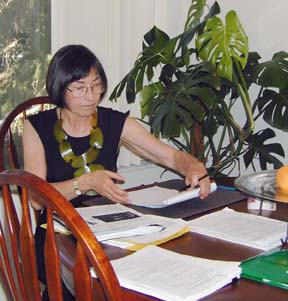 7:50
a.m. Patty, as she is known by
98 percent of those she encounters, meets me at the door dressed
for the hot day ahead and adorned by her signature oversized
jewelry. (She has agreed to let a Journal reporter shadow
her for a day.) Her small apartment holds a mix of newly purchased
furniture and special art objects she brought from her Eureka
home -- an iron and glass candleholder, a hinged wooden box from
a friend. "I brought some of my treasures. I just had to
have some familiarity around me since I only get home about twice
a month." There is also a perfect split-leaf philodendron
in one corner and, over by the fireplace, an orchid in full bloom
-- testaments to her skill with plants. "Lizzy and I took
a master gardener class 12 years ago," she explains.
7:50
a.m. Patty, as she is known by
98 percent of those she encounters, meets me at the door dressed
for the hot day ahead and adorned by her signature oversized
jewelry. (She has agreed to let a Journal reporter shadow
her for a day.) Her small apartment holds a mix of newly purchased
furniture and special art objects she brought from her Eureka
home -- an iron and glass candleholder, a hinged wooden box from
a friend. "I brought some of my treasures. I just had to
have some familiarity around me since I only get home about twice
a month." There is also a perfect split-leaf philodendron
in one corner and, over by the fireplace, an orchid in full bloom
-- testaments to her skill with plants. "Lizzy and I took
a master gardener class 12 years ago," she explains.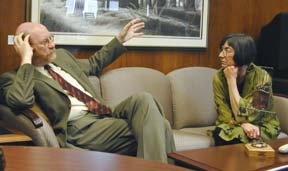 9:20
a.m. Patty introduces her office
staff of four. Assemblymember John Laird (D-Santa Cruz) [photo at left] is
the first to drop by. He has just returned from a 14-stop, two-day
swing around the state to sell a Democratic version of the budget,
one crafted by Chesbro, who heads the Senate budget committee.
Democrats are willing to make $11 billion in cuts if coupled
with a bond financed by a half-cent sales tax increase. Laird
is particularly upbeat and says civic leaders he spoke to were
receptive to the plan. He says there was some willingness to
support raising income tax on the highest wage earners in the
state, too.
9:20
a.m. Patty introduces her office
staff of four. Assemblymember John Laird (D-Santa Cruz) [photo at left] is
the first to drop by. He has just returned from a 14-stop, two-day
swing around the state to sell a Democratic version of the budget,
one crafted by Chesbro, who heads the Senate budget committee.
Democrats are willing to make $11 billion in cuts if coupled
with a bond financed by a half-cent sales tax increase. Laird
is particularly upbeat and says civic leaders he spoke to were
receptive to the plan. He says there was some willingness to
support raising income tax on the highest wage earners in the
state, too.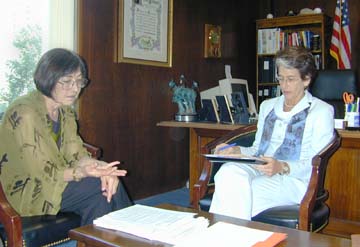 11:30
a.m. Patty meets with Assemblymember
Hannah-Beth Jackson [on
the right in photo at right] ,
head of the women's caucus, who has also just returned from the
same two-day trip as Laird but to different cities. "How
was it?" Patty asks hopefully. "Not fun. Not very constructive.
Everybody's getting hammered," comes the blunt reply. Patty
counters with a positive report of the Laird trip then launches
into the purpose of the meeting. She is there to brief her colleague
on the Garamendi/workers' comp meeting. She strongly urges the
caucus to adopt the issue as a priority.
11:30
a.m. Patty meets with Assemblymember
Hannah-Beth Jackson [on
the right in photo at right] ,
head of the women's caucus, who has also just returned from the
same two-day trip as Laird but to different cities. "How
was it?" Patty asks hopefully. "Not fun. Not very constructive.
Everybody's getting hammered," comes the blunt reply. Patty
counters with a positive report of the Laird trip then launches
into the purpose of the meeting. She is there to brief her colleague
on the Garamendi/workers' comp meeting. She strongly urges the
caucus to adopt the issue as a priority.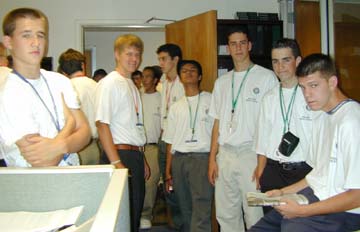 1:55
p.m. Since the party caucus is
mandatory, Patty misses all of the afternoon's activity back
at the office as well as lunch. I am not allowed in caucus, so
I wait in her office. Her staff take over in her absence, meeting
separately with a Humboldt State University political science
class and a group of 29 boys from Boys State, a high school civics
club. The Boys Staters at one point all jam into Patty's inner
office for a lecture on how a bill becomes a law. It is wall-to-wall
white T-shirts and the temperature inside begins to resemble
that outside. Some of us leave for a food run and some fresh
air.
1:55
p.m. Since the party caucus is
mandatory, Patty misses all of the afternoon's activity back
at the office as well as lunch. I am not allowed in caucus, so
I wait in her office. Her staff take over in her absence, meeting
separately with a Humboldt State University political science
class and a group of 29 boys from Boys State, a high school civics
club. The Boys Staters at one point all jam into Patty's inner
office for a lecture on how a bill becomes a law. It is wall-to-wall
white T-shirts and the temperature inside begins to resemble
that outside. Some of us leave for a food run and some fresh
air.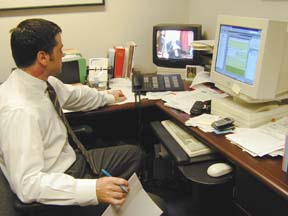 But
once again the budget topic returns. As a newcomer, I ask, how
different is Sacramento than she thought it would be, and how
did the budget impasse come about?
But
once again the budget topic returns. As a newcomer, I ask, how
different is Sacramento than she thought it would be, and how
did the budget impasse come about?